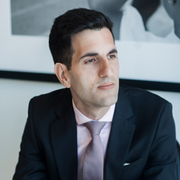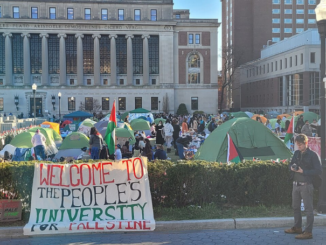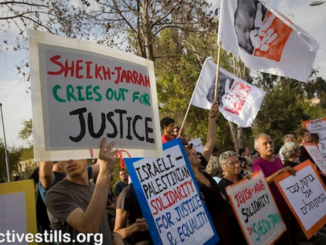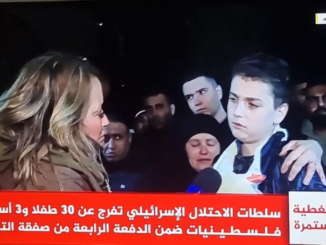
Pro-Israeli group, B’nai Brith, is threatening legal action against pro-Palestinian activist and rabbi, David Mivasair.
I thought for a while about how to write this article.
First, I decided I’d focus on how a pro-Israeli group, B’nai Brith, is threatening legal action against pro-Palestinian activist and rabbi, David Mivasair.
According to the group, he made false allegations against them. But, based on what’s already publicly known, they are mainly true. If you read them, which you can in a press statement the group released on the action, they point to the group’s longstanding anti-Palestinian racism and strong support for the Israeli state.
Toronto-based lawyer and pro-Palestinian activist, Stephen Ellis, wrote a detailed article—in an important historical context—that illuminates this well. Perhaps coincidentally it was only written a few months before B’nai Brith made their statement.
Eventually, I decided I’d focus on something else. Talking mainly about the legal action would, I felt, inevitably involve exploring what’s already largely known about the hostility B’nai Brith has towards anything Palestinian and so be a rehashing of the old.
I would like to focus on David himself. He is a good person. And he’s also a friend.
David is not a hateful person. Though I’ve only known him personally for a short while, I’ve come to see that what motivates everything he does is love. Not just for Palestine but for humanity.
He understands that there are certain things you never, under any circumstances, do to people. You don’t for example unnecessarily harm them, as Israel does routinely to Palestinians, be it in violently displacing them from their homes or killing them unprovoked by gunfire.
That kind of behavior is not only illegal under international law. It’s also an egregious moral evil.
This is what David, as both an activist and rabbi, fights against.
I remember one of the first times I saw David at a pro-Palestinian demonstration he was wearing a purple t-shirt that said the Judaism he upholds does not support the occupation. Being somewhat shy I photographed him in his inspiring shirt. It wouldn’t be til much later that I’d talk to and also become friends with him.
In that time David, more than a friend, has also been a mentor to me. With patience and calm he’s helped me understand what Judaism is actually all about, how it is fundamentally about respect and justice for all. That could involve being “difficult” with others sometimes, challenging people to rethink what has been normalized such as the view that Israel is a “democracy”, or that it wants peace with the Palestinian people, rather than continue in its brutal campaign of ethnic cleansing agents them.
On several occasions, he’s helped me see how small actions, such as organizing a modest political demonstration, are important and that every time we do that we chip away at the credibility of oppressors who the actions contest. For example, when I was uncertain about the value of me possibly protesting a documentary screening—featuring a Nakba denier, Irwin Cotler—he shared with me that even my presence alone would get at least a few people who saw me to think about how Israel is invested in Palestinian erasure. That would have a ripple effect and more people in the world would act, in some way, to help further prevent that.
This encouraged me to go forward with the protest. And I was grateful others joined me too. They already knew what David alluded to: whatever our size as a group we’d have some pro-Palestinian impact. Our presence upset some people but it also got others, as evinced in our conversations with them, to think more deeply about what role they could play in the larger struggle for Palestinian justice.
There is no hatred in David’s heart. I asked him once about those who slander him as a “self-hating Jew”, and whether he thought they were in some sense bad as malicious people.
“No,” he replied, “I just think they have a different conception of things. They’re misguided as to what Israel is actually about”.
I think it’s wise to follow David’s example here. He recognizes the error of those that unfairly treat him with contempt—for no good reason and ultimately because he stands for Palestinian justice (what is right and necessary)—but he does not respond in kind. He does not, as they do to him, maliciously or cruelly attack them. He is morally above that, not endorsing the dark potential within us all to pursue revenge (on a petty or seriously level) against those who hurt us.
Nothing praiseworthy comes of this. It only invites, if you will, the target of the revenge to “get back at us”. And whatever primal satisfaction either side might feel in the process is a far cry from justice. It simply confirms that the integrity or well-being of another person has been undermined. This, in contrast to the true aim of justice, deviates from restoring goodness in the world.
B’nai Brith veers similarly. If it’s serious about justice, as the language of its legal action against David suggests, then why did they sponsor and favorably introduce a Toronto talk last February, featuring anti-Palestinian racist and Nakba denier Caroline Glick? Why will they go after someone like David who is trying to actually end hate, in the form of Israel’s violent criminality and human rights abuses against Palestinians, and not someone like her? B’nai Brith’s actions recall those who want to present Israel in a favorable light, denying they are committing any sorts of atrocities—historically or at present.
It’s not only a disingenuous attempt to convey Israel as “good” but one that effectively says that what the state is doing to Palestine, as well as Palestinian people themselves, are fiction. If “successful” this protects Israel from further gaining a bad reputation. Among other reasons, this is particularly odious because it involves erasing, from the public mind, the suffering of others.
We need more like David to counter this. He embodies what it means to speak difficult truths so that the suffering of others, Palestinians in this case, is not made invisible. Through his speech, protest and teaching important lessons to people like me—but one Palestinian ally—he simultaneously brings that suffering into the open and makes us more aware of what can be done about it.
That might bother B’nai Brith and so it should. No group should be endorsing a state that is so committed to the suffering of Palestinians or any people at all.

– Paul Salvatori is a Toronto-based journalist, community worker and artist. Much of his work on Palestine involves public education, such as through his recently created interview series, “Palestine in Perspective” (The Dark Room Podcast), where he speaks with writers, scholars and activists. He contributed this article to The Palestine Chronicle.









David isn’t a real rabbi. Stop calling him one. He along with his distasteful views are unwelcome at pretty much every single synagogue, anywhere. Your article neglects to mention this. You also try and paint b’nai brith as some kind of fanatical, genocidal organization. You don’t say anything of the sort about hamas, who are in fact trying i murder every single Jew everywhere, as that is their creed. Funny that.